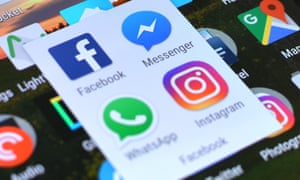Messaging service will begin sharing private information with Facebook and is preparing to allow businesses to message users

All messages sent using an up-to-date version of WhatsApp are sent encrypted end-to-end from the sender to the recipient preventing WhatsApp or anyone else from reading its contents. As a by-product, it also blocks the company targeting ads against what is said in messages, a common tool used by Facebook, Google and others.
What’s unclear is whether WhatsApp will allow companies to send users marketing messages. The company insists that it will not allow spam and is simply testing systems that replicate the current communications sent to users from banks, airlines and other services that use SMS to notify customers of events such as fraud alerts or travel delays.
However, the company’s updated privacy policy states that “messages you may receive containing marketing could include an offer for something that might interest you”.
Users can block messages being sent to them from numbers or accounts entirely, which should mean they can also block any messages sent from companies, should the function remain unchanged.
The company still insists that it does not sell ads when activating the service, linking to a blog post from 18 June 2012 titled “why we don’t sell ads” that emphatically states that “remember, when advertising is involved you the user are the product”. The post was made before the sale of billion-user messaging service to Facebook, although the company insists that the values still stand.
Multi-pillar approach
Facebook has been making moves to increase its share of user time on mobile devices by pushing services such as Facebook Messenger and WhatsApp that operate in addition to its core social network and Facebook app. In doing so it has added further users, beyond those signed up and using Facebook, to its user base.
But it has yet to fully leverage that non-Facebook userbase for its main revenue generating activity, advertising. Instagram has advertising, but neither WhatsApp nor Facebook Messenger currently does.
Messenger has been used as a test bed by Facebook for interactions with chatbots, brands and businesses, allowing users to book tickets to shows, ask for news and have services delivered to them in text or multimedia form along with their friends’ messages.
Although the crossover between WhatsApp and Facebook’s other services is undoubtedly high in developed nations, WhatsApp’s strength has been in reaching those who would not use or cannot use Facebook in developing nations and areas of poor connectivity.
How Facebook proceeds with revenue generation from the messaging service beyond the obvious customer service activities without spamming users remains to be seen. Many fear the introduction of marketing messages and other ads, despite the assurances of WhatsApp that there will be no spam.